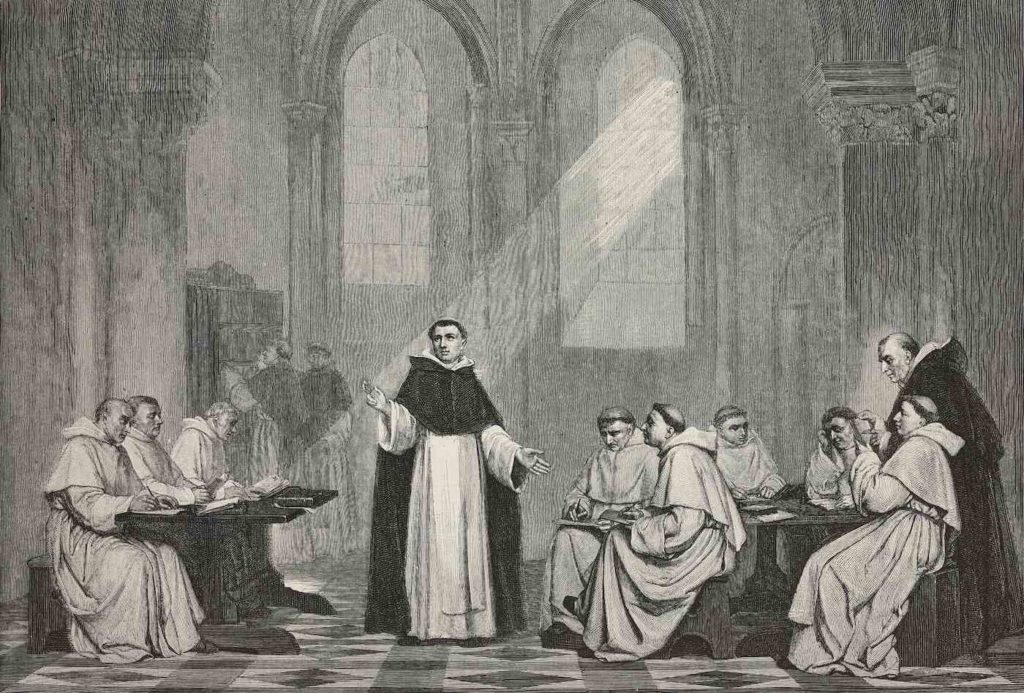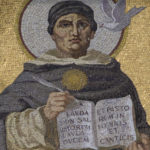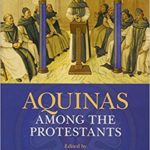Thomas Aquinas (1225–1274) is one of the two most famous Catholic theologians and philosophers; the other is Augustine (354–430). Seven hundred years ago, on 18 July 1323, Pope John XXII presided at Aquinas’s canonization as a saint. In 1567, Pope Pius V proclaimed Aquinas to be a “Doctor of the Church,” one whose teachings occupy a special place in Catholic theology. Thomas was the first thinker after the time of the Church Fathers to be so honored. In 1879 Pope Leo XIII issued a famous encyclical, Aeterni Patris: On the Restoration of Christian Philosophy, calling on all Catholic educational institutions to give pride of place to the theology and philosophy of Thomas Aquinas. Although today he is a well-established authority in both philosophy and theology, in his own time he was considered a revolutionary thinker whose views challenged the accepted intellectual establishment of the West.
As a young man in Italy, Thomas joined the recently founded Dominican Order. Along with the Franciscans, the Dominicans were part of a widespread reform movement within the Catholic Church. In many ways these new religious orders were urban-based youth movements and, to be effective in their apostolate of reform in the Church, the Dominicans sought out the ablest young men and quickly established houses of study in the great university centers, such as Bologna, Paris, and Oxford.
Thomas traveled north to Paris (1245) to study with Albert the Great at the University of Paris. Albert was already well known for his work in philosophy, theology, and the natural sciences. Like other Dominicans of his time, Thomas walked to Paris from Italy; and then, with Albert, he walked to Cologne (1248) where the Dominicans were establishing another center of studies. He came back to Paris (in 1252) to complete his studies to become a Master of Theology. After three years in Paris, he spent the next ten years in various places in Italy, only to return to Paris in the late 1260s. There, he once again occupied a chair as Master of Theology and confronted various intellectual and institutional challenges, especially concerning the proper relationship between philosophy and theology.
In his own time, Aquinas was considered a revolutionary thinker whose views challenged the accepted intellectual establishment of the West.
Start your day with Public Discourse
Sign up and get our daily essays sent straight to your inbox.Aristotelian Revolution
Universities in the thirteenth century were relatively new institutions—centers of lively intellectual life. In addition to a liberal arts faculty, the universities had advanced faculties of law, medicine, and theology. Paris was especially famous for its faculty of theology. Thomas was a member of a brand-new religious order, and his professional life was often connected with this new institution in the West, the university. The growing intellectual authority, and relative institutional autonomy, of the new universities often represented a challenge to the established order, both religious and secular.
Thomas lived at a critical juncture in the history of Western culture. The vast intellectual revolution in which he participated was the result of the translation into Latin of almost all the works of Aristotle. Aristotle offered, so it seemed, a comprehensive understanding of man, of the world, and even of God. In the Divine Comedy, Dante’s Virgil calls Aristotle “the master of those who know.”
Aristotle’s works came to the Latin West in the late twelfth century and first half of the thirteenth century, with a set of very compelling, and often conflicting, interpretations from Muslim and Jewish sources: thinkers such as Avicenna, Averroës, and Maimonides. How should Christian theologians react to this new way of understanding things? Aristotle’s claims about the eternity of the world, the mortality of the human soul, and how to understand happiness seemed to represent a fundamental challenge to Christian revelation. Should the teaching of Aristotle be rejected, or at least restricted? Many Christian thinkers in the thirteenth century thought so, and there were various attempts—mostly unsuccessful—throughout the century to ban Aristotle from the curriculum of the new universities. The most famous were lists of condemned propositions in 1270 and 1277, issued by the Bishop of Paris, Étienne Tempier.
Thomas, following his teacher Albert, was among the first to see, and to see profoundly, the value for Christian theology that Aristotle’s scientific and philosophical revolution offered. Thomas was first of all a theologian, committed to setting forth clearly the fundamentals of the Christian faith. But, precisely because he was a theologian, he recognized that he had to be a philosopher and have scientific knowledge as well. His most famous theological work, the Summa Theologiae, contains many philosophical arguments that have their own formal independence and validity, yet are organized in the service of Christian truth. Thomas recognized that whatever truths science and philosophy disclose cannot, in the final analysis, be a threat to truths divinely revealed by God: after all, God is the author of all truth—the truths of both reason and faith. Thomas thought that by reason alone it was possible to demonstrate not only that there is a God but that this God is the creator of all that is. He argued that faith perfects and completes what reason can tell us about the Creator and all creatures.
Precisely because he was a theologian, Aquinas recognized that he had to be a philosopher and have scientific knowledge as well.
As an astute student of Aristotle, Thomas was critical not only of those who ignored Aristotle, but also of those who, sometimes in the tradition of Averroës, read Aristotle in a way that did indeed result in contradictions of Christian belief. Thomas’s philosophical position was not mainstream in his own day; rather, his more traditional colleagues’ views were more widely accepted. Nowhere was this difference more apparent than in debates about the proper relationship between philosophy and theology on a wide variety of questions about human nature and the doctrine of creation. Those opposed to Thomas came from what can broadly be called an Augustinian tradition, which resolutely insisted that philosophy must always teach what faith affirms. Thomas did reject the kind of excessive philosophical autonomy found in Averroës, but he also rejected the tendency toward fideism found in his more traditionalist opponents.
Thomas wrote extensive commentaries on major Aristotelian treatises, such as the Physics, the De Anima (On the Soul), the Posterior Analytics, the Metaphysics, and the Nicomachean Ethics, in which he sought to present comprehensive views of these subjects. One can see Thomas employing principles drawn from Aristotle, as well as from other sources in Greek philosophy, in his wide-ranging collections of disputed questions On Truth and On the Power of God, in Summa contra Gentiles, and even in his biblical commentaries.
Creation and Causality
Throughout his writings, Thomas is keen to emphasize the importance of thinking analogically: recognizing, for example, that to speak of God as cause and of creatures as causes requires that the term “cause” be predicated of both God and creatures in a way that is both similar and different. For Thomas, an omnipotent God, complete cause of all that is, does not challenge the existence of real causes in nature, causes that, for example, the natural sciences disclose. God’s power is so great that He causes all created causes to be the causes that they are.
One of his greatest insights concerns a proper understanding of God’s act of creating and its relationship to science. The natural sciences explain changes in the world; creation, on the other hand, is a metaphysical and theological account of the very existence of things, not of changes in things. Such a distinction remains useful for discussions in our own day about the philosophical and theological implications of evolutionary biology and cosmology. The subject of these disciplines is change, indeed change on a grand scale. But as Thomas would remind us, creation is not a change, since any change requires something that changes. Rather, creation is a metaphysical relationship of dependence. Creation out of nothing does not mean that God changes “nothing” into something. Any creature separated from God’s causality would be nothing at all. Creation is not primarily some distant event; it is the ongoing causing of the existence of whatever is.
In one of the more radical sentences written in the thirteenth century, Thomas claimed that “not only does faith hold that there is creation, but reason also demonstrates creation.” Here he is distinguishing between a philosophical and a theological analysis of creation. Arguments in reason for the world’s being created occur in the discipline of metaphysics: from the distinction between what it means for something to be (its essence) and its existence. This distinction ultimately leads to the affirmation that all existence necessarily has a cause.
The philosophical sense of creation concerns the fundamental dependence of any creature’s being on the constant causality of the Creator. For Thomas, an eternal universe would be just as much a created universe as a universe with a temporal beginning. From the time of the Church Fathers, theologians always contrasted an eternal universe with a created one. Thomas did believe that the universe had a temporal beginning, but he thought that such knowledge was exclusively a matter of divine revelation, as disclosed in the opening of Genesis and dogmatically affirmed by the Fourth Lateran Council (1215).
The theological sense of creation incorporates the philosophical sense. Thomas viewed creation as much more than what reason alone discovers. With faith, he sees all of reality coming from God as a manifestation of God’s goodness and ordered to God as its end. This relationship is a grand panorama of out-flow and return, analogous to the dynamic life of the Persons of the Trinity.
With faith, Aquinas sees all of reality coming from God as a manifestation of God’s goodness and ordered to God as its end.
As the German philosopher and historian Joseph Pieper observed, the doctrine of creation is the key to almost all of Thomas’s thought. The revolutionary nature of Thomas’s position on creation is evident in the way it differs from that of his teacher, Albert the Great, and his colleague at the University of Paris, Bonaventure. Both thought that the fact of creation could only be known by faith and that a created world necessarily meant a world with a temporal beginning. Neither fully appreciated Thomas’s observation that creation is not a change. In fact, one of the condemnations of 1277 by the Bishop of Paris noted that it was an error to hold that creation is not a change.
It may be difficult for us to appreciate the radical nature of Thomas’s thought, especially his brilliant synthesis of faith and reason that honored the appropriate autonomy of each. Thomas does not fit easily into a philosophical or a theological category. He thought that human beings could come to knowledge of the world and of God, but he also recognized that a creature’s knowledge of the Creator must always fall short of what and who the Creator is.
For Thomas, reason—deployed in all the intellectual disciplines (including philosophy and the natural sciences)—is a necessary complement to religious faith. After all, a believer is a human being: a rational animal. Faith perfects but does not abolish what reason discloses. In deploying his understanding of the relationship between reason and faith, Thomas offered what were for his time radically novel views about nature, human nature, and God. What commends these views to us—and what was later realized by the Catholic Church—is not their novelty but their truth. Ironically, in the context of today’s intellectual currents that reject metaphysics and embrace various forms of materialism, Thomas’s thought is once again a radical, if not revolutionary, enterprise.














